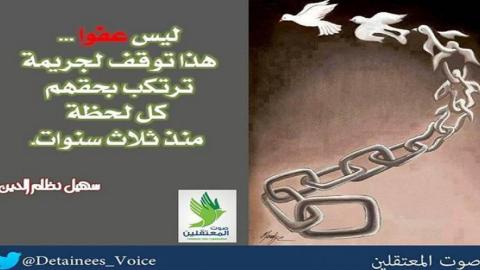The latest “presidential pardon” was met with mixed feelings amongst Syrians. On the one hand, there was palatable relief at seeing so many of their young men and women walk free from the notorious detention centers of the Assad regime. On the other hand, there is an unmistakable bitter taste to the irony that the perpetrator brazenly announces “pardons” for its victims.
The “presidential pardon” was hailed by the Syrian regime’s media as a magnanimous step on the part of President Assad. A message was sent to all cell phones saying that the “presidential pardon is an expression of the continuing embrace between Syria and its sons.” The response was clear: “What about the continuing embrace of those still in detention centers?”
Syrian activists were galvanized by the brazenness of the Syrian regime in hailing such “pardon” and took to social media to express their outrage. Suheil Nizam al-Din wrote that: “This is not a pardon. This is merely a pause in a continuing crime against Syrians.” The quote was used by the Voices of Syrian Detainees Facebook page in a poster designed in protest, along with the following sentence: “Only in Syria: The criminal pardons his victims.”
The indignation, however, did not distract Syrians from celebrating their newly-freed heroes. Facebook pages of Syrian human rights lawyers Michel Shammas and Anwar al-Bunni, as well as other pages dedicated to Syrian detainees - Voice of Detainees, We Want Our Detainees, Yara Sabri’s page - posted live updates about the released detainees and their state.
These pages also functioned as a space to distribute advice to the families of detainees on how to follow up the cases of their loved ones, and to spread warnings from certain scammers who claim to be able to hasten the release of some for a fee. The pages also led the way in raising the awareness on how to support those newly-released and how to reintegrate and help them through this sensitive period.
The joy of those released is tempered, however, by the tragedies of others. Some, like Nuaimi Muhammad, went to meet their loved ones expecting their release, only to be told that they had died in detention, presumably from torture. Or others like Yara Fares, who could barely celebrate her release before the news came that her father had passed away the previous day.
The physical state of the detainees was very telling of the suffering they had endured. Alice Mufraj, once a detainee herself, described them as a “shadow of a skeleton. With grim prospects, they either run away to the first border to leave the country, or, in those few who still have a fight inside of them, wait for death from a bomb or a stray bullet.”




